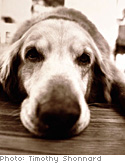Octavia Butler's Aha! Moment
Eye Witness

Who would have imagined that when writer Octavia Butler gazed into a dog's eyes, her perspective would change forever?
When I was between 2 and 3 years old, I got to know my first non-human being. The non-human was a cocker spaniel named Baba. We weren't friends, Baba and I, nor enemies. He wasn't my dog. He belonged to the people my mother worked for, and he lived in the house with them and us. My father had died, and my mother had to find work that would support the two of us. She became a maid. She had been a maid before she married—she had been taken out of school when she was only 10 and put to work to help feed herself and her younger brothers and sisters. Now she was a maid again, "staying on the place," as it used to be called, living in her employer's home and having no home of her own.For me, the house—with its big rooms, broad halls, high ceiling and wide stairways—was home. It was where I was when I began to explore the world around me. It's the first place I remember.
The household was large and I felt at home. There was my mother, a maid; my grandmother, the cook; two of my uncles, who were gardeners and handymen; and, of course, the white family who owned the house—a man, a woman, a boy and a girl. A few years later when I was given my first-grade reader, Fun with Dick and Jane, the family became, in my mind, characters named Mother, Father, Dick, Jane and Spot, the dog. The only characters in the book who were missing from real life were Sally, the baby, and Puff, the cat.
No matter. Spot—Baba—was the one I focused on, the one whose name I still remember. One day he and I found ourselves sitting nose to nose on the floor of the upstairs hall. Baba and I were about the same size, although Baba was older, long past his puppyhood. He sat and looked at me while I sat and looked at him. How it happened that we were suddenly paying attention to each other at the same time, I don't know. No doubt Baba had investigated me before, but I hadn't been aware of it. Now, for the first time, I began to notice him. He had dark, clear eyes, a wet nose, a mouth that seemed to smile somehow. I didn't know what he was, but I knew he was alive, aware and looking back at me. I touched him and stared at him. He bore it patiently. With surprise and bottomless curiosity, I began to understand that he was someone else. He wasn't like any of the people in the house. He was someone else entirely.



